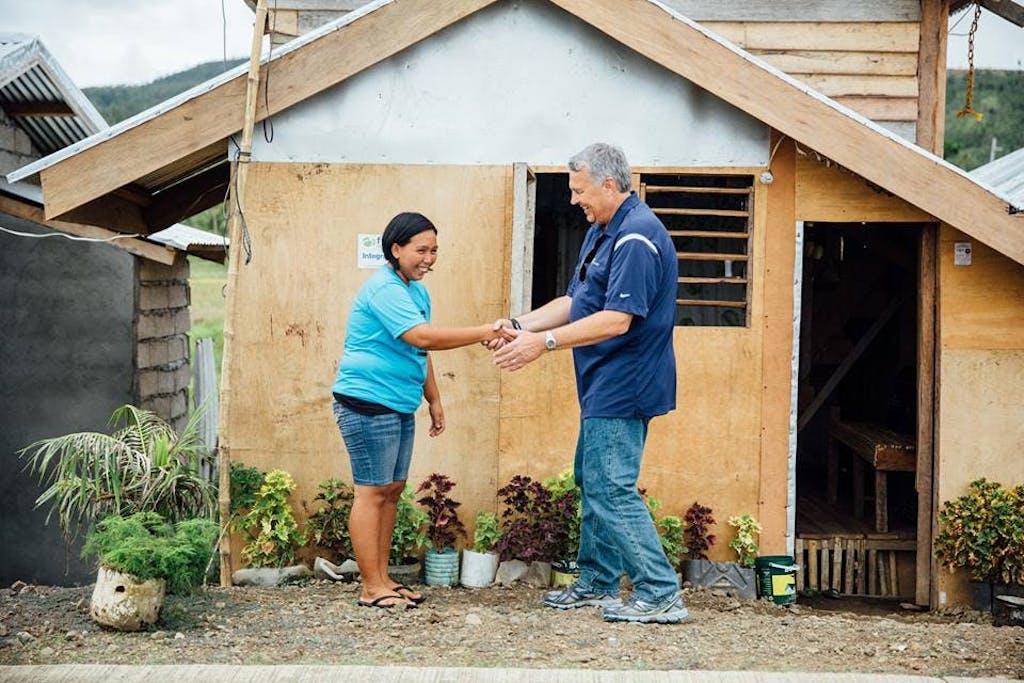In over thirty years of traveling around the world and learning about solutions to end poverty, the question that seems to be the most important one to ask is this: are these solutions sustainable?
Sustainable Change Leads to Lasting Impact
While I care about all the different ways that help to eliminate poverty in the most vulnerable places in the world, I want to make sure that efforts are done with respect and dignity with those who are meant to benefit from them. Our efforts should make a quantifiable difference in the lives of the poor, so they may thrive and bless others. So, I cannot simply stop with the question, “Are we making an impact?” The more important question is, “Are we making a sustainable, lasting impact?”

I kept this question front of mind during a past trip to Samar, Philippines. Following Typhoon Haiyan’s devastation in 2013, I wanted to see how the Filipino people had responded to this disaster. And I wanted to find out if their solutions were making a sustainable impact.
But why? It’s very challenging for a community to revitalize physically and spiritually so soon after a cataclysmic disaster. In my experience, this process typically can take years! So, what element of the relief effort made this situation unique? One answer was vividly apparent to me.
Community-Owned Transformation
From the moment FH entered the community of Basey, we saw how committed the community was to their self-penned rallying cry, “Better than before.” We were also astonished to see how they were taking responsibility to make change happen. The community knew it wasn’t Food for the Hungry (FH) staff who would bring about lasting sustainable transformation. It wouldn’t be outside organizations or the government who would piece their lives back together. They had the power within themselves, as a community and with God’s help, to become “better than before.”

Over the next few days we saw countless examples of this…
- One day we attended a “hand over” ceremony of a community health center. FH helped the community connect into the government health network. Then, they began to host weekly clinics and health consultations. With relief funds, a small clinic was opened and is now providing critical health assistance to a community that never had it before.
- We visited a co-op of pedicab drivers who received livelihood training from FH. They are now pooling their resources to set up a garage for repairs and to store tools and parts. This efficiency has allowed them to increase profits and provide safer transportation within the community.
- I was thrilled to hear about FH staff training families on how to set up rainwater collection systems. These systems collect rainwater off the roofs of homes. The water is then saved for cleaning and bathing. FH then helped broker a deal with the local government, so that families could be contracted out by the local government to install rainwater catchment systems throughout the region, after given training.
- We met several community-based savings groups that were receiving FH trainings on how to organize and pool their savings. This allows them to grant small business loans within their community. This is a proven method to build the earning potential of a community without giving handouts or a monetary investment.
The common thread of all these examples is that the community is owning their transformation. They are in the driver’s seat and taking control of their future. I see FH as the Driver’s Ed instructor. We offer suggestions and guidance, but ultimately we are along for the ride with the intent to exit the car.
Planning Our Exit
At FH, we plan our exit strategy. It is thrilling to see communities take control of their future. It is evident that in order to make a sustainable difference in the lives of the most vulnerable, we must support and promote community ownership of both the problems they face and solutions to them. If we are serious about ending poverty together, then we should all champion the slogan “better than before” — together.
More articles you may be interested in:
Disaster Reduction: How FH is Minimizing Risk in the Philippines


